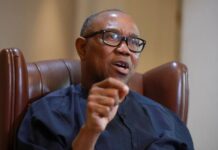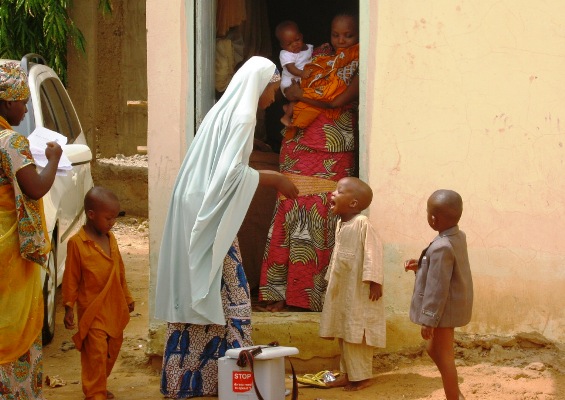As Africa’s largest economy, most highly populated country, and biggest consumer market, Nigeria has been hailed as the next frontier for pharma after South Africa and the hotspots of Northern Africa. With support from Code for Africa Wanadata, Ndidichukwu Odoh, reports on the importation and use of counterfeit drugs in Nigeria, and its implication to health and economic development of the nation.
Forty-year-old Mallam Umar resides in Roguwa community in Uke Nasarawa State Nigeria. He is one among many Nigerian fathers surviving the burden of out-of-pocket cost for healthcare.
On a Tuesday morning his 12-year-old daughter, Maimuna woke up with stomach pain, she was stooling, restless and weak. Umar, a farmer quickly comes to “Dr Abdullahi” a patent medicine vendor also called chemist in Nigerian Parlance.
Abdullahi is not a trained medical doctor to earn the name, neither is he a pharmacists to earn so much trust from the people in Roguwa Community. What makes him stand out for those who patronize him is that he sells all the drugs.
“He simply learnt drug business as a trade and is good at it,” says one of the customers who gave her name as Madam Mary.
“I buy drugs from ‘Doctor’ because anytime you come, he has drugs and he will sell for you and the sickness will go, the health centre don’t have drugs, if you go there they will delay” said Umar when asked why he came to buy drugs from Abdullahi instead of taking his sick daughter to the nearby Primary Health Care Centre.
By the number of years Abdullahi has made his drug sale in Roguwa, the people believe he saves lives and he is called “Doctor Abdullahi”.
To treat Maimuna he simply puts a powdery substance in a bottle of water, gives to Umar and tells him to give the little girl.
At the lowest and most important stage-the retailer and consumer relationship- this is how drug business is done in Nigeria.
According Umar, “Dr. Abdullahi” has been in the drug business for years so he could predict the disease and what to give at a cheap and affordable price.
Working with Aanu Rotimi the Program Manager Health Reform Foundation of Nigeria (HERFON) and co-convener SDGs interactors in remote communities of Nasarawa, Niger and Kaduna states, the story is the same, patent medicine is huge business. Drugs are bought and sold at cheaper rates. At most rural communities in Nigeria there are no Pharmaceutical shops where original drugs could be bought, where they exist, the drugs are expensive.
In Kagaroko Local Government of Kaduna State, anti-malarial drug-Coartem is sold at N500 in a patent shop owned by Amos Tagwai, while a nearby Pharmacy sells Coartem at N1200. Residence patronize Amos more than they visit the Pharmacy.
“The pharmacy man too like money” says Miriam Bako when asked why she would patronize Amos and not the nearby pharmacy. Does Miriam know the meaning of fake drugs and illicit drugs? She said “fake drug is expired drugs, Amos does not sale expired drugs, I have been buying drugs from him for many years, no problem”
Counterfeit drugs, especially antimalarial and antibiotics are on high demand in Nigeria, but pose huge challenge in the control of their circulation. The National Agency for Food and Drug Administration Control (NAFDAC) says it is the high demand of these drugs that stimulates the traffic of these pharmaceutical products into Nigeria.
The Disease in a fast growing economy
Between 2015 and 2017, some N29 billion worth of counterfeit drugs were destroyed. NAFDAC says of all the drugs in circulation in Nigeria, 3.6% are estimated to be counterfeit.
“NAFDAC is committed to combat the circulation of fake and counterfeit drugs because they have no value. N29 billion worth of counterfeit drugs was destroyed in 2017, this how much those in this dastardly business would have made, without bothering the implication on the health of the consumers,” says Director of Special Duties, Abubakar Jimoh.
Ignorance in itself is a disease, but more dangerous and ravaging in Nigeria is the worrisome disease burden, the presence of communicable and non-communicable diseases, with intense cases of drug resistance, and substandard drugs in circulation.
“This chronic non-communicable diseases (NCDs) includes hypertension, stroke, coronary heart disease in addition to diabetes, mental health disorders and cancer, while infectious diseases has placed a double burden of disease on an otherwise poorly funded healthcare system in Nigeria” says Dr Ben Anyene, Chairman Health Sector Reform Coalition (HSRC).
Women and children are more at risk, as WHO 2015 report suggest that neonatal death rate is 33.3 per 1000 live births while maternal mortality ratio is 814 per 100,000 live births in Nigeria.
“The burden of disease in Nigeria is very high and 70 per cent of these are at the Primary Health Care (PHC) level, a great challenge for every women and child in Nigeria,” Said Anyene.
Despite the destabilizing impact poor intervention in health poses to Nigeria’s development, it suffers food scarcity, rising poverty rate amidst a huge population growth and poor access to quality drugs for treatment of diseases.
“After food drugs is the next essential needs for Nigerians,” says Edwin Akpotor Program Manager Pharmaceutical Society of Nigeria PSN-PACFaH@SCale.
According to Reuters, Nigeria’s population grows by 11,000 a day and the global Population Reference Bureau (PRB) projects by 2050, it will be the world’s fourth most populous country, with 400 million people-this may exceed projected figure for the United State by 2050.
With currently over 170 million people in the speedily rising population, poverty, hunger, scarcity, agitation and diseases are common, though world business promoters call it an “investment hub”, experts working in communities like Aanu Rotimi says it is a problem.
“our population is rising with other social vices with it, the environment can’t keep pace with a population growing at 2.4 percent every year” says Aanu Rotimi who emphasized that while the population is growing, certain structures, regulations and governance is not improving thereby making Nigeria more prone to social vices.
While countries in Asia and Latin America put in efforts to reduce fertility rate, a 2012 World Bank Study puts Nigeria’s rising population at five children per woman. The United Nations also predicts sub-Saharan Africa’s Population will double by 2045 to 2 billion. Nigeria will account for a fifth of that and Rotimi Says “our education and health system can’t cope with that”.
According to GAVI the vaccine alliance, in 2018 Nigeria’s population is projected at 196,752, 811, with a birth cohort of 7,417,798, while surviving infants is estimated to be at 6,922,833 and an infant mortality rate of 69 per 1,000 birth-under 1 year, and 109 per 100 births for child mortality-children under 5 years (NDHS 2015).
With the high rate of disease outbreak going with a rising population, health financing is low, despite many years of oil boom and funding. Nigeria however funds health with global support. GAVI the vaccine alliance in a counterpart funding arrangement with Nigerian Government has spent $809.0million on immunization for both Non-vaccines support 26% at $ 207,248,327 and vaccine support at 75%- a $601,749,958 in Nigeria. Below is a breakdown detailing funding to huge number of children born every year in Nigeria.
While the population rises, disease burden increases with out-of-pocket spending which accounts for the bulk of the healthcare expenditure. The rise in non-communicable diseases like diabetes and heart disease gives pharmaceutical companies opportunity to position themselves as long-term partners to the government by providing access to much needed medicines.
Multinationals and Nigeria Drug Business
Mckinsey suggests that the value of the Nigerian Pharma market could rise by as much as 9 percent a year over the next ten years to reach $3.6 billion by 2026, making it as large as South African Market today. It says over the same period, Nigeria could contribute between $1.9billion and $2.2 billion to pharma sales growth, 55 percent of it from drug prescription. “This is why multinationals are interested in Nigeria,” Akpotor said.
Kristine Peterson author of “Speculative Markets: Drug Circuits and Derivative Life in Nigeria” who teaches at the University of California, Irvine. In an interview with Premium Times in August 2015, had said since the 1970s the American and European brand name pharmaceutical companies saw the Nigerian population as buoyant purchasers at the time the naira was at par with the dollar and pound
“There was a fairly robust middle class and people were able to afford many of the products produced by those corporations. However, the moment the economy started to take a downturn after Babangida’s 1986 implementation of structural adjustment, many things changed.
“On the one hand, the private sector could no longer cope because the value of the naira was crashing. It also became risky for drug companies to do business because the population could no longer afford their drug products. Because of that risk, the brand name multinational drug companies abandoned the Nigerian market that they themselves created.
The Naira Problem
The devalued naira problem according to Peterson’s research had more implications to the health of Nigerians than imagined as at the 1980s.
She said, making profits is one thing, but growing at this rate would mean bringing four or five new drugs to market each year. Because it takes 10 to 15 years to develop a new drug and bring it to market, it is impossible for drug companies to meet these demands.
Peterson said pharma companies engage in speculative practices, like merging and acquiring other companies; they offshore much of their businesses to India and China to save on costs; they pursue drug development that will lead to blockbuster profits and skip making other needed drugs such as those for neglected tropical diseases; and like in Nigeria, they dump assets, drug products, and entire markets that may not be serving them well.
“Nigerian drug traders may engage in very similar kinds of speculative practices – ones that require them to anticipate and then bet on risky investment strategies in hopes of high returns.
“So the point here is that everything begins with Wall Street pressures, which result in intense incentives to respond to market volatility and downward pricing pressures. This is all about surviving the market and not producing new products that respond to and adequately address health needs.
Are there Regulations in Nigeria?
Responding to sale of substandard drugs falsified drugs in Sub-Saharan African Countries like Nigeria, Dr Tedros Adhanom Ghebreyesus, WHO Director-General says, “Substandard and falsified medicines particularly affect the most vulnerable communities. Imagine a mother who gives up food or other basic needs to pay for her child’s treatment, unaware that the medicines are substandard or falsified, and then that treatment causes her child to die. This is unacceptable. Countries have agreed on measures at the global level – it is time to translate them into tangible action.”
According to findings, India and China have been the major source of drugs and medicines, this is due to their low labour costs and large supply of skilled talent, Indian and Chinese drug companies are able to produce generic drugs and medicines that are cheap and affordable for millions of Nigerians.
Food and Drug Administration and Control (NAFDAC), has struggled for years to close in on a rampant fake drug market. Though the exact number of counterfeit drugs is contested, many malaria deaths in Nigeria are linked to the use of fake medicines. African countries like Nigeria are the dumping ground for 40% of the world’s recorded counterfeit drugs. Others have addressed this problem as well with technology, including mPedigree, a Ghanaian company founded by 2015 Quartz Africa Innovator, Bright Simons.
According to Jimoh, about seven persons have been convicted in the last two years, with one serving a seven-year sentence without option of fine, for the production and sale of fake drugs. He also said no fewer than 50 cases related to counterfeit drugs offenses are pending in various courts across the country.
Although Nigeria has shown commitment in the fight against counterfeit drugs, there is still the presence of these products everywhere in the market.
“Why should we allow our country to be a testing ground for all manner of vaccines and drugs? What our manufacturers need is encouragement and the provision of an enabling environment with the required and competitive infrastructure.” Anyene asked
In March 2018, the national president of Pharmaceutical Society of Nigeria (PSN) Alhaji Ahmed Yakassai, in a press conference said that the country is presently importing 70 per cent of pharmaceutical products as against 30 per cent exportation. A situation he described as appalling caused by weak regulation and poor coordination of all the regulatory bodies in Nigeria.
Nigeria reviewed its National Drug Formulary and Essential Medicines List (NDF) last in 1989, 29 years after with the global technology advancement and growth of drug market, most drugs used in Nigeria are no longer in use in other countries.
“This is what makes the country a dumping ground, most of the drugs are simply dumped for Nigerians,” Apkotor said.
“What would change is Nigeria’s ability to enforce rules and regulations. However, there is a significant improvement, which is now attracting investments, most local industries are building and refurbishing plants to meet new global standards especially the WHO requirement. There is also expansion of portfolio and product range by Nigerian pharmaceutical companies, like the May and Baker” Anyene said adding that soon Investors will return to Nigeria reason being that the regulatory agencies are stronger and efficient to an extent. There is determination by government to support regulation to create enabling environment for pharmaceutical industries.
Local Production
According to Pharmacists Akpotor, a country of over 180million people is attractive and a hub for drug manufactures globally. This is however taken advantage of by all kinds of people in “drug business”.
With over 70% of imported drugs being used in Nigeria and only 30% locally produced, the population is an unlocked potential yet to be utilized by the nation.
“Investors look for Nigeria while Nigeria needs investors to build its economy to the pharmaceutical sector, but the problem is that they come in through the “back door” Anyene said stating that If Nigeria can stiffen its regulatory laws and empower the local manufacturers as well, this sector is capable of meeting Nigeria’s economic needs.
For Akpotor, the local Manufacturing of drugs could make regulation much more easier, but the nation’s inability to invest in drug research and promotion of enabling environment for investors is why most of the production are done outside Nigeria.
“The market in Nigeria made investors more careful, they have to cater for power supply, access to market and other needs that are not available at the moment” Akpotor added.
“Some factors affect the realization, of local manufacturing; there is unfair competition between multinationals and local producers, Importation of cheaper brands of drugs, smuggling, dumping and all sorts. We have a case of everyone wanting to be in the Nigerian Market but not wanting to come in through the front door,” said Akpotor he further stressed that there is poor consumption of locally made pharmaceutical products by Nigerians and high competition with products coming from China and India.



























